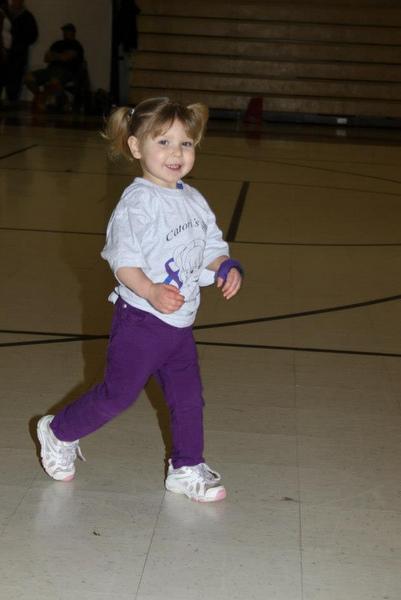“Hey sweetie, what happened to you?” We hear people innocently ask our 4-year-old daughter that question sometimes. Occasionally, they cut Catori out all together and ask us directly. It’s not a frequent occurrence, but it normally happens a few times a month. When we tell people Catori has cerebral palsy as a result of a stroke, they gives us a look of utter disbelief and inevitably always blurt out, “Oh no, I’m so sorry.”
The thing is, we actually don’t like it when people say they’re sorry. We smile politely and assure them there’s nothing to be sorry about. However, it rubs us the wrong way.
It’s not that we don’t appreciate the sentiment. We realize everyone generally has the best of intentions in saying it. We also understand people don’t expect us to say those words when they see Catori, because she has mild cerebral palsy, more specifically she has left hemiparesis, which affects only her left side. By most appearances she’s what many consider your “typical” 4-year-old kid. She speaks and acts what medical professionals have deemed at an age-appropriate level. She walks, she runs and she plays with other kids her age.
So when people hear the words “stroke” and “cerebral palsy,” there’s a natural disbelief and the words “I’m sorry” fly out their mouths. They really are sorry that such an innocent, perfect little child has to deal with such a diagnosis. Some are just plain sorry they even asked the question.
What many of them never realized is babies and children can have strokes just as adults do. According to the American Stroke Association’s website, “stroke occurs in one out of every 4,000 live births” in the U.S., and “between 20 percent and 40 percent of children die as a result of a stroke.” Those are some scary numbers. For many people, even if they are unaware of those numbers, imagining such a scenario can be overwhelming for parents who have expectations and dreams for their child’s future. A normal response to hearing that another child you just met had a stroke is probably going to be “I’m sorry.” But as Catori’s father I sometimes just want to scream, “Don’t be sorry! We’re not!”
That’s right, we’re not sorry Catori has CP. We wish she didn’t have a stroke. We went through an emotional roller coaster after finding out she did. Realizing she had CP and was now labeled as a child with a disability was heart-wrenching at first.
Then we contemplated what the alternative was. Catori had a stroke, something that is fatal to adults and children across the globe every year. She is a survivor! She has gone from not realizing she had a left arm and hand to using it to climb ladders on the playground and opening blankets for her baby dolls. She hugs us every night and tells us how much she loves us. She attends a mainstream preschool and is practicing to play T-ball with her older sister next year.
Sure, she does things a little differently than others. She has also been diagnosed with epilepsy and takes multiple medicines on a daily basis to control the seizures. But she survived a stroke in the middle right cerebral artery of her brain before she was even born. And she’s flourishing! That’s not something to be sorry about, folks. That’s something to be celebrated and embraced.
Please realize we understand and appreciate why people say they’re sorry when they first hear Catori had a stroke and has CP. We’re not angry people do it. We just believe people should think first before asking questions and be prepared for the answers they may hear.
Don’t be shocked when you get an answer you didn’t expect. Be compassionate for sure, but also be aware. We personally appreciate when people follow up our CP answer with questions about the diagnosis and/or therapies.
Not all people in our situation will want to talk about it, though, so be cognizant of that as well. We believe most people will appreciate it if you simply talk to them as adults about the diagnosis and what that means to their family and child.
We tell people Catori wakes up every morning, and she gets to live her life no matter what the day brings. Some days are good. Some days are tougher than others. Other days are filled with only therapy sessions and doctor’s appointments. But she’s alive. Every day we get to see her beautiful, smiling face and the only words we need to say are simply, “Thank you.”
Follow this journey on Catori’s Story — Our Baby Girl’s Journey with Cerebral Palsy.
The Mighty is asking the following: Share with us the moment you stood up for yourself or your child in regards to disability or disease, or a moment you wish you had? If you’d like to participate, please send a blog post to community@themighty.com. Please include a photo for the piece, a photo of yourself and 1-2 sentence bio. Check out our “Share Your Story” page for more about our submission guidelines.

